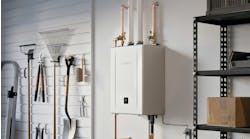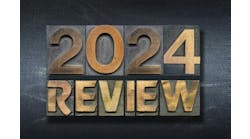Latest from Plumbing
Monthly Plumbing Quiz: 2024 in Review
Sponsored
QUINCY, MASS. — The National Fire Protection Association has come as close as any code body has so far to mandate fire sprinklers in all new one-and two-family dwellings.
At its 2005 World Fire Safety Conference and Exposition in June in Las Vegas, the membership of the NFPA voted to require fire sprinkler systems in all new one-and two-family houses. The action took place through floor votes in support of amendments to two separate consensus documents, the NFPA 101 Life Safety Code and the NFPA 5000 Building Code.
The National Association of Home Builders immediately challenged the action on NFPA 101. The vote on the NFPA 5000 Building Code went unchallenged.
The NAHB claimed that the decision of the Committee on Residential Occupancies to mandate residential sprinklers, coming at the end of the public comment period, did not allow sufficient public review. This opposition was countered by support for dwelling sprinklers from various organizational representatives, including the NFPA Fire Service Section, the Center for Campus Firesafety, the Illinois Fire Inspectors Association, Underwriters Laboratories, the Washington State Fire Marshal's Office, the American Public Health Association and the Firefighter Life Safety Initiatives Project.
"This is truly an historic day in the annals of fire safety," said National Fire Sprinkler Association President John Viniello.
The NAHB appeal of the 2006 edition of NFPA 101 is based on the fact that NFPA has not complied with the procedures for making a substantive change in a new or existing American National Standard, said Lawrence Brown, construction codes and standards specialist at NAHB. The American National Standards Institute has a procedure in the ANSI Essential Requirements entitled, "Due process requirements for American National Standards."
The requirements would apply to any NFPA document where a substantive change has been made and the change has not been afforded public comment as required by the ANSI Essential Requirements, Brown said.
The NFPA Standards Council met in late July to hear any challenges. The council is required to issue a written opinion addressing NAHB's appeal of NFPA 101 before NFPA could make any announcements or approve the new editions of NFPA 101 and NFPA 5000, said NFPA spokesman Gary Keith. That announcement came after CONTRACTOR's press time.
The builders' biggest concern could be the influence a sprinkler requirement would have on building codes. All building codes are adopted at either the state or local level but most adapt one or more national model codes.
NFPA is a partner with the International Association of Plumbing and Mechanical Officials, Western Fire Chiefs Association, and the American Society of Heating, Refrigerating and Air-Conditioning Engineers in developing and publishing the Comprehensive Consensus Codes. ANSI, the administrator and coordinator of the U.S. private sector voluntary standardization system accredit the C3 codes.
In addition to IAPMO's Uniform Plumbing Code and Uniform Mechanical Code, the C3 set includes: NFPA 5000; NFPA 101; NFPA 70, National Electrical Code; NFPA 1, Uniform Fire Code; NFPA 54, National Fuel Gas Code; NFPA 58, Liquefied Petroleum Gas Code; NFPA 30, Flammable and Combustible Liquids Code; NFPA 30A, Code for Motor Fuel Dispensing Facilities and Repair Garages; and NFPA 900, Building Energy Code (ASHRAE 90.1 and 90.2).
The other major national model code body, the International Code Council, does not have a residential sprinkler requirement, but many ICC members are fire chiefs who tend to favor sprinklers.

